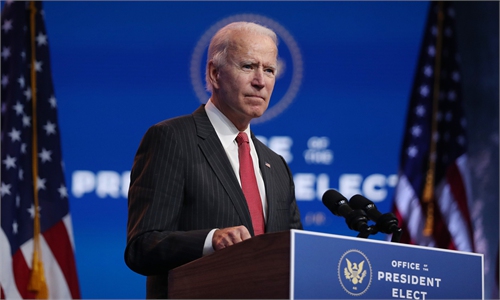
Illustration: Liu Rui/GT
Taiwan's so-called finance minister Su Jain-rong said in an interview on Wednesday that Taiwan and the US are going on with a plan to improve energy projects and finance infrastructure in Asia and Latin America. Su claimed that this will provide an "alternative" to the Chinese mainland-proposed Belt and Road Initiative (BRI), and some believe this will be a US-Taiwan version of the BRI.The so-called US-Taiwan version of the BRI is a pseudo-concept. Indeed, the US has reached agreements with 17 countries and regions to expand partnerships on infrastructure investment in third countries, trying to act against the BRI. However, the plan is more of a political move than an economic one, because it lacks funds. Second, it is a plan designed to counter the BRI, rather than a plan based on market demand.
It is completely a political hype. Whether it is the US or Taiwan, they are very unlikely to really pay to improve infrastructure or connectivity in Latin America or anywhere else. Taiwan is not the only one that has reached such an agreement with the US. Stressing the "US-Taiwan version" is in itself a hype.
Neither the US nor Taiwan has any real intention to invest in a "belt and road." Their hype is intended to serve political purposes. For the US and Taiwan, it is not important to increase connectivity, but to enhance their political ties. This is their real political purpose, not cooperation on an economic project.
Su said that the US and Taiwan's plan stipulates the use of capital raised from the private sector to "ensure greater transparency." There is no basis for this, because most private sector players will not invest for the US and Taiwan's political purpose. Because their so-called plan is essentially a political project, not an economic one, will the private sector invest in the plan for the sake of politics, not market?
Since their plan is a political project and not based on the laws of the market economy, some of its goals are opaque. When the so-called transparency includes political goals, it becomes like a castle in the air and would make no sense.
The US and Taiwan's act will not have any substantial impact on the BRI, because their plan is not a substantial economic plan at all. But it aims to improve the so-called US-Taiwan official relations. This is the crux of the problem.
China should now adopt an independent approach to Taiwan secessionists. Concentrating on doing its own things well is the most important task in fundamentally cracking down on Taiwan secessionist forces. If China takes countermeasures on every outrageous step of the US and Taiwan, then it may lose sight of its major task - to increase its own strength. If China does not handle its own things well, then it will not have strength to achieve reunification. This is a long-term struggle.
Joe Biden is about to assume office. But it is American politicians' common practice to contain China's rise and split China. In other words, almost no American politician wants to see peace in China. Therefore, no matter who comes to power in the US, increasing the mainland's strength to fight against Taiwan secessionists will be an eternal theme.
But it's worth noting that compared with Donald Trump, a non-establishment and non-traditional politician, Biden will not act so madly on the Taiwan question.
However, hindering cross-Straits peaceful communication and reunification will always be a US strategy.
The article was compiled by Global Times reporter Li Qingqing based on an interview with Yang Xiyu, a senior research fellow at the China Institute of International Studies. liqingqing@globaltimes.com.cn

